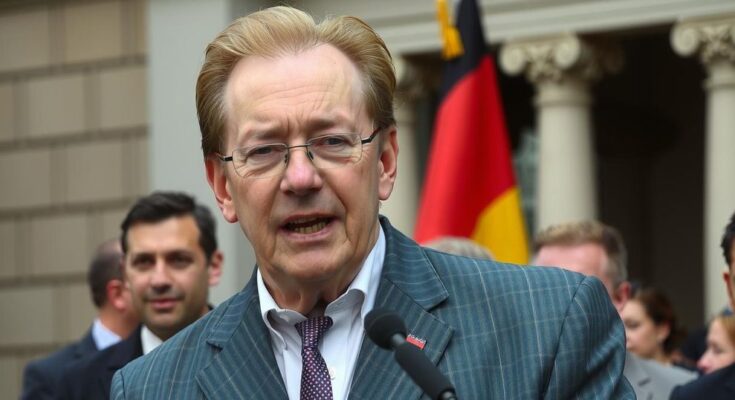Elon Musk has publicly supported Germany’s far-right AfD, claiming it as the country’s only hope against economic collapse and cultural decline. His commentary, published in Welt am Sonntag, has incited outrage among German politicians who view it as foreign interference in national politics. Musk’s statements raise concerns about the acceptance of extremism and the responsibility of media platforms in promoting balance and democracy during electoral periods.
In a recent op-ed published in the Welt am Sonntag, American tech mogul Elon Musk reiterated his support for Germany’s far-right political party, the Alternative for Germany (AfD). Musk claims that the AfD represents a critical hope for the nation amidst what he perceives as potential economic and cultural decline due to immigration policies. He argued that those labeling the party as extremist are misguided, referencing the same-sex partnership of the party’s leader, Alice Weidel, as evidence against such a classification. The publication of Musk’s article instigated significant backlash from various German political figures and media professionals, with accusations of undue foreign interference in domestic politics. In particular, prominent politicians criticized Musk for attempting to destabilize Germany’s political landscape, aligning his actions with autocratic tendencies, including those of Russian President Vladimir Putin.
The contentious nature of Musk’s involvement highlights broader questions regarding the role of international figures in domestic political dialogues and the acceptance of extremist sentiments in mainstream political discourse. Moreover, there are concerns about the potential ramifications for the AfD’s visibility and legitimacy in Germany’s cultural and political fabric, especially given Musk’s considerable influence as a billionaire with a substantial global following.
Background information regarding Germany’s political environment indicates a historical context where press freedom is constitutionally protected, yet journalists face ethical dilemmas when foreign figures interfere in local political matters. Musk’s influence invites examination of the delicate balance between opinion expression and the responsibility of media platforms in a democratic society, particularly in trying political climates.
Elon Musk’s endorsement of the AfD arises amid a period of rising right-wing populism in Europe, where the party has managed to secure approximately 20% of voter support. The AfD claims to advocate for traditional German values and voices concerns over immigration policies, presenting itself as a viable alternative to established political parties. However, it is often demonstrated through surveys that many voters express apprehension about the party’s extremist tendencies, further complicating its public perception. The intertwining of foreign influence and domestic political structures raises broader questions about the integrity of democratic processes in the face of wealthy and powerful individuals who may advance their interests at the expense of national integrity.
In summary, Elon Musk’s vocal support for the AfD has ignited a significant political controversy in Germany, raising pertinent questions about the influence of foreign individuals on domestic politics and the normalization of far-right ideologies. The backlash to Musk’s op-ed underscores the complexities surrounding media responsibility and the safeguarding of democratic values amid external political pressures. As Germany approaches its upcoming elections, the implications of such endorsements may have far-reaching effects on the political landscape and ongoing debates surrounding nationalism and democracy within the country.
Original Source: www.dw.com




